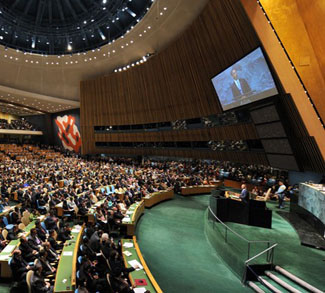Will China seek energy salvation in gunboat diplomacy or technological cooperation?
On the eastern, ascendant flank of the Eurasian continent, the Chinese vertigo economy is overheated and too-well integrated in the petrodollar system. Beijing, presently, cannot contemplate or afford to allocate any resources in a search for an alternative. (The Chinese economy is low-wage and labor-intensive centered. Chinese revenues are heavily dependent on exports and Chinese reserves are predominantly a mix of the USD and US Treasury bonds.) To sustain itself as a single socio-political and formidably performing economic entity, the People’s Republic requires more energy and less external dependency. Domestically, the demographic-migratory pressures are huge, regional demands are high, and expectations are brewing. Considering its best external energy dependency equalizer (and inner cohesion solidifier), China seems to be turning to its military upgrade rather than towards the resolute alternative energy/Green Tech investments – as it has no time, plan or resources to do both at once. Inattentive of a broader picture, Beijing (probably falsely) believes that lasting containment, especially in the South China Sea, is unbearable, and that – at the same time – fossil-fuels are available (e.g., in Africa and the Gulf), and even cheaper with the help of warships.
In effect, the forthcoming Chinese military buildup will only strengthen the existing and open up new bilateral security deals of neighboring countries, primarily with the US – as nowadays in Asia, none wants to be a passive downloader. Ultimately, it may create a politico-military isolation (and financial burden) for China that would consequently justify and (politically and financially) cheapen the bolder reinforced American military presence in the Asia-Pacific, especially in the South China Sea. It perfectly adds up to the intensified demonization of China in parts of influential Western media.
Hence, the Chinese grab for fossil fuels or its military competition for naval control is not a challenge but rather a boost for the US Asia-Pacific – even an overall – posture. (Managing the contraction of its overseas projection and commitments – some would call it managing the decline of an empire – the US does not fail to note that nowadays half of the world’s merchant tonnage passes though the South China Sea. Therefore, the US will exploit any regional territorial dispute and other frictions to its own security benefit, including the costs sharing of its military presence by the local partners, as to maintain pivotal on the maritime edge of Asia that arches from the Persian Gulf to the Indian Ocean, Malacca and South China Sea up to the northwest–central Pacific.) A real challenge is always to optimize the (moral political and financial) costs in meeting the national strategic objectives. In this case, it would be a resolute turn of China towards green technology, coupled with the firm buildup of the Asian multilateralism. Without a grand rapprochement to the champions of multilateralism in Asia, which are Indonesia, India and Japan, there is no environment for China to seriously evolve and emerge as a formidable, lasting and trusted global leader. Consequently, what China needs in Asia is not a naval race of 1908, but the Helsinki process of 1975.
Opting for either strategic choice will reverberate in the dynamic Asia–Pacific theatre. However, the messages are diametrical: An assertive military – alienates, new technology – attracts neighbors. Finally, armies conquer (and spend) while technology builds (and accumulates)! At this point, any eventual accelerated armament in the Asia-Pacific theatre would only strengthen the hydrocarbon status quo. With its present configuration, it is hard to imagine that anybody can outplay the US in the petro-security, petro-financial and petro-military global playground in the following few decades. Given the planetary petro-financial-tech-military causal constellations, this type of confrontation is so well mastered by and would further only benefit the US and the closest of its allies.
Within the OECD/IEA grouping, or closely; the G-8 (the states with resources, infrastructure, tradition of and know-how to advance the fundamental technological breakthroughs), it is only Japan that may seriously consider a Green/Renewable-tech U-turn. Tokyo’s external energy dependencies are stark and long-lasting. After the recent nuclear trauma, Japan will need a few years to (psychologically and economically) absorb the shock – but it will learn a lesson. For such a huge formidable economy and considerable demography, situated on a small land-mass which is repeatedly brutalized by devastating natural catastrophes (and dependent on yet another disruptive external influence – Arab oil), it might be that a decisive shift towards green energy is the only way to survive, revive, and eventually to emancipate.
An important part of the US–Japan security treaty is the US energy supply lines security guaranty given to (the post-WWII demilitarized) Tokyo. After the recent earthquake-tsunami-radiation armageddon, as well as witnessing the current Chinese military/naval noise, Japan will inevitably rethink and revisit its energy policy, as well as the composition of its primary energy mix.
Tokyo is well aware that the Asian geostrategic myopias are strong and lasting, as many Asian states are either locked up in their narrow regionalisms or/and entrenched in their economic egoisms. Finally, Japan is the only Asian country that has clearly learned from its own modern history, all about the limits of hard power projection and the strong repulsive forces that come in aftermath from the neighbors. Their own pre-modern and modern history does not offer a similar experience to other two Asian heavyweights, China and India. That indicates the Far East as a probable zone of the Green-tech excellence and a place of attraction for many Asians in the decade to come.
The opinions, beliefs, and viewpoints expressed by the authors are theirs alone and don’t reflect any official position of Geopoliticalmonitor.com.




